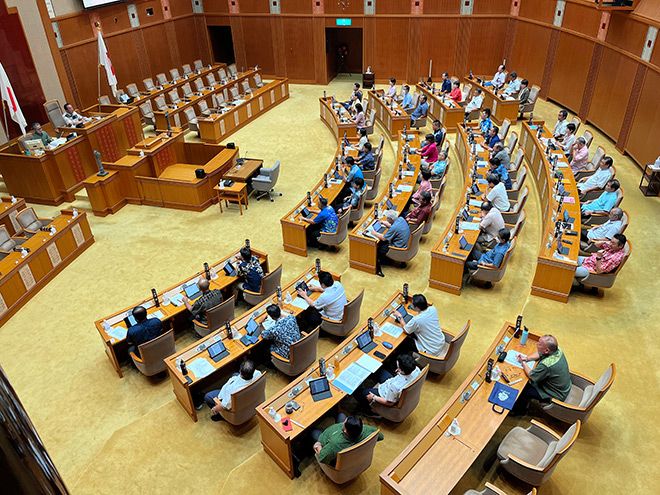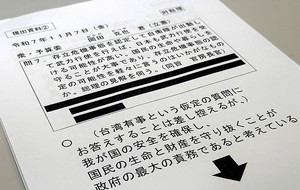THE ASAHI SHIMBUN
July 11, 2024 at 12:57 JST
 The Okinawa prefectural assembly unanimously adopts a resolution and statement of protest against the rash of sexual assaults by U.S. servicemen on July 10. (Taro Ono)
The Okinawa prefectural assembly unanimously adopts a resolution and statement of protest against the rash of sexual assaults by U.S. servicemen on July 10. (Taro Ono)
NAHA—The Okinawa prefectural assembly unanimously adopted a resolution and a statement of protest against the U.S. military and the central government over a series of sex crime cases involving U.S. servicemen stationed here.
The assembly on July 10 demanded measures to prevent a recurrence as well as revisions to the Japan-U.S. Status of Forces Agreement, which grants privileged status to U.S. military personnel suspected of crimes committed in Japan.
In the June prefectural assembly election, candidates supported by the ruling Liberal Democratic Party and its junior coalition partner, Komeito, gained a majority for the first time in 16 years.
Allies of Okinawa Governor Denny Tamaki, who has long protested the heavy U.S. military presence in the prefecture, fell into the minority.
But on this issue, the ruling and opposition parties aligned themselves in a bipartisan protest.
The resolution and the statement describe the latest incidents involving U.S. servicemen as “extremely vicious crimes that not only inflict physical and mental suffering on the victims but also violate their human dignity.”
They said the U.S. military as an organization “has a problem with human rights awareness,” and the assembly “protests with fury that is all over our body.”
They called for revisions of SOFA, which stipulates that U.S. forces can continue to detain American military personnel until they are indicted by Japanese authorities.
As of July 10, at least 17 municipal assemblies in the prefecture had adopted similar resolutions and statements of protest. Fifteen of them are demanding SOFA revisions.
Since June, the prefectural government learned for the first time about five sexual assault cases involving U.S. servicemen in the prefecture that occurred from last year.
The Foreign Ministry, Okinawa prefectural police and the Naha District Public Prosecutors Office said they did not inform prefectural government officials of these incidents to protect the privacy of the victims.
SOFA became a major point of contention after the 1995 abduction and sexual assault of an Okinawa schoolgirl. Prefectural police issued arrest warrants for three U.S. servicemen, but the U.S. side refused to hand over the suspects, citing SOFA.
The three were not extradited until after they had been indicted.
In response to the huge outcry from residents, Japan and the United States agreed to make an operational improvement under which the U.S. side would “give favorable consideration” to extradition before indictment in cases of murder, sexual assault and other heinous crimes.
But to date, the Japanese side has requested extradition before indictment in only six cases nationwide, one of which was denied by the U.S. side. The last request was made in 2008.
The Japanese side did not ask the U.S. side to hand over the suspects involved in the latest cases.
“Every time there is an incident or accident, we have demanded discipline and prevention of a recurrence, but nothing has been done to rectify the situation,” said a prefectural assembly member from the central part of Okinawa’s main island, where a large concentration of bases is located.
“Unless the agreement is revised so that domestic laws can be applied, the U.S. military cannot be restrained,” the assembly member said.
(This article was written by Taro Ono and Satsuki Tanahashi.)




















A peek through the music industry’s curtain at the producers who harnessed social media to help their idols go global.
A series based on diplomatic documents declassified by Japan’s Foreign Ministry
Here is a collection of first-hand accounts by “hibakusha” atomic bomb survivors.
Cooking experts, chefs and others involved in the field of food introduce their special recipes intertwined with their paths in life.
A series about Japanese-Americans and their memories of World War II